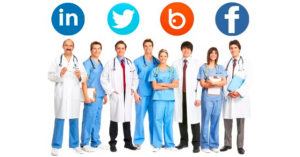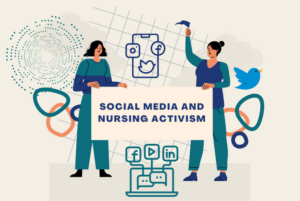The Do’s and Don’ts of Using Social Media Use as a Nursing Professional
 Nurses use social media every day for personal and work-related reasons. They access platforms, blogs, video sites, and forums to network, share information, find support from peers, and improve their nursing knowledge and skills. While social media is an important tool for nurses, it does come with some risks.
Nurses use social media every day for personal and work-related reasons. They access platforms, blogs, video sites, and forums to network, share information, find support from peers, and improve their nursing knowledge and skills. While social media is an important tool for nurses, it does come with some risks.
Unfortunately, nurses receive little training on how to use social media professionally. The ability to quickly post or share information without proper guidance on legal or professional issues presents a challenge for the nursing community.
What is social media?
Social media includes interactive technologies that help people create and share information, ideas, and interests in virtual communities. Popular platforms include Facebook, Instagram, TikTok, Snapchat, and Reddit, along with messaging services like WhatsApp and WeChat. Media sharing sites like YouTube and Pinterest also count, as do blogs and podcasts. Nurses may use social media more than they realize.

Struggling to meet your deadline?
Get your assignment on The Do’s and Don’ts of Using Social Media Use as a Nursing Professional done by certified MDs and PhDs in the USA. ORDER NOW!
What are the benefits of using social media?
Nurses use social media in many ways, and in may ways it offers numerous benefits:
- Education: It allows learning anytime, anywhere. Nurses can find educational content that fits different learning styles, with real-time access to important information.
- Peer Support: Interacting online helps nurses feel connected and supported by peers. Social media provides safe spaces for sharing stories and advice.
- Disaster Response: During emergencies, social media is often the first place to share information. During COVID-19, nurses used social media to communicate and advocate for their needs.
- Networking: It’s easier to build professional contacts without location barriers. Nurses can connect with other healthcare professionals and potential employers for career advancement.
Risks of Using Social Media
Despite the benefits, there are risks for nurses using social media:
- HIPAA Violations: Sharing protected health information (PHI) can lead to violations. Examples include:
- Sharing photos or PHI without patient consent.
- Posting comments or pictures that accidentally reveal patient information.
- Violating Employer’s Policies: Nurses may unintentionally break conduct rules, like sharing a company logo without permission or posting during work hours.
- Loss of Job or License: Posts can lead to job loss or even losing a nursing license. For instance, nurses at Emory Hospital lost their jobs after a viral TikTok video mocking expectant mothers (Atlanta, 2022), and a Florida nurse was fired for posting baby photos (Miami, 2021).
- Lawsuits: Nurses can be sued for their social media posts.
Privacy: A Legal and Ethical Obligation
Nurses must protect patient privacy as a legal and ethical duty. The American Nurses Association emphasizes the importance of privacy to maintain trust in healthcare. The Health Insurance Portability and Accountability Act (HIPAA) requires nurses to keep all PHI confidential.
Best Practices for Nurses Using Social Media
To navigate social media safely, nurses can follow these tips:
- Check Privacy Settings: Understand and update privacy settings on all platforms regularly.
- Know Your Employer’s Policies: Familiarize yourself with your healthcare organization’s social media rules.
- Be Cautious While Posting: Understand if it’s allowed to post during work hours.
- Avoid Sharing Patient Information: Never share PHI, even accidentally. This includes discussing cases or showing patient info in the background of photos.
- Report Privacy Violations: If you see others breaking patient privacy rules, report it as per your facility’s policy.
- Don’t Take Photos at Work: Avoid taking photos to prevent accidental sharing of PHI.
- Blur Your Badge in Photos: Cover your badge for safety and privacy reasons.
- Share Credible Information: Make sure what you post is reliable and accurate.
- Maintain Professionalism: Avoid discussing drugs, alcohol, or negative comments about patients or employers online.
- Be Careful with Patient Connections: Keep professional boundaries when interacting with patients on social media.
- Watch for Identity Theft: Be cautious about sharing personal information online to protect against fraud.
- Don’t Share Logos Without Permission: Always get written approval before sharing your employer’s logo.
- Disclose Paid Content: If you post sponsored content, make sure to identify those relationships.
The Internet is Permanent
Once something is posted online, it’s hard to remove. Consider the internet a permanent record. Always think about whether your content would be acceptable in a legal setting.
Nurses can benefit from using social media for professional reasons, but they should always be careful and think about the possible consequences. The internet doesn’t forget.
The following references further outline the Dos and Donts of using social media for nursing professionals

Dont wait until the last minute.
Provide your requirements and let our native nursing writers deliver your assignments ASAP.
- “American Nurses Association Position Statement on Privacy and Confidentiality”
- American Nurses Association: “Social Media Principles”
- Association of Pediatric Hematology/Oncology Nurses: “Position Paper on the Nurse’s Use of Social Media”
- Healthy Nurse, Healthy Nation Blog: “Social Media Do’s and Don’ts for Nurses”
- International Council of Nurses: Position Statement on Nurses and Social Media
- International Nurse Regulator Collaborative: “Social Media Use: Common Expectations for Nurses”
- National Council of State Boards of Nursing: “A Nurse’s Guide to the Use of Social Media”
- The HIPAA Journal: “HIPAA and Social Media Guidelines”


